Roma
Author: Stefan Feld
Publisher: Queen Games
Year: 2005
review by

| x |
|
|
|
|
|
|
|
|
|
|
|
|
|
|
|
|
|
|
|
|
|
|
|
|
|
|
|
|
|
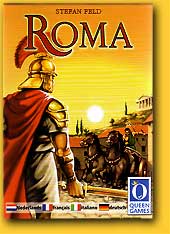 |
Six large discs each with one side of a die are laid out between two players; there is no shadow of a doubt in this game; the players are going to throw dice! And it all is about points, despite the fact that the blurb text on the box makes us beleieve ti all is about the power in Rome. Anyway, we are armed with cards; and by playing various cards and combinations thereof we try to achieve a preset goal: gather as much points in laureate wreaths.
We start with a hand of four cards, choose two of them and give the other two to our opponent; the other player does the same. The four cards at this time may put behind our side one of the six discs, one per disc, without additional costs. We are also handed out ten victory points to start with, but every turn we will have to hand in one point per empty spot behind a disc; so in the first turn already two must be paid back. |
|
|
|
| x |
|
|
|
|
|
|
|
|
|
|
|
|
|
|
|
|
|
|
|
|
|
|
|
|
|
|
|
|
|
In a player's turn he first throws three dice; these results can be used to activate placed cards (buildings or persons) or to take money or cards by placing one or more of the dice on the corresponding disc. A player gets as much money as the sum of one or more dice that are put on the money disc.
To put (build) a card on the table no die is required. But it costs money, the varying amount is displayed in the left hand corner on every card. When all six positions are occupied, a card may be disposed and replaced by a new card. |
|
  |
|
|
| x |
|
|
|
|
|
|
|
|
|
|
|
|
|
|
|
|
|
|
|
|
|
|
|
|
|
|
|
|
|
|
|
| x |
|
|
|
|
|
|
|
|
|
|
|
|
|
|
|
|
|
|
|
|
|
|
|
|
|
|
|
|
|
Every card has a special ability; to activate, it usually needs the commitment of a die roll. There are cards that attack the card on the opposite row. Every card shows a different defensive value; the attacker has to throw equal or more to win - in that case the defender takes away his card. All this information is depicted on the cards by icons.
From research done in signing several years ago it became clear that the comprehension of those signs in general stops after the widely understood icons for toilet and exit. From there, it fastly deteriorates, and the icons in this game are no exception. It still requires often consultation of the rules for an explanation of the doubted icon. The German version called 'Revolte in Rom' differs from this; here all cards have the explaining text on them. This is very convenient, but it is understandable that the international version does not cover every language with their own deck of cards. |
|
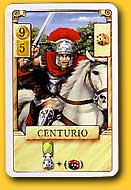 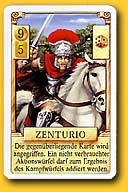 |
|
| x |
|
|
|
|
|
|
|
|
|
|
|
|
|
|
|
|
|
|
|
|
|
|
|
|
|
|
|
|
|

|
|
The game can end very soon if one player has very good starting cards. The mercator for instance allows a player to buy (all remaining) laureate wreaths from the other player. And the forum, when activated, allows a player to use any one or more dice and exchange it for points from the stock. But more often, play swings back and forth, and a player could play a centurio who attacks the opposing card where that card could as well be the forum!
The game ends when a player runs out of all his wreaths - in which case the other player has won, or when the stock of wreaths is exhausted; then the player with the most points wins.
|
|
|
|
 |
|
|
|
|
|
|
|
|
|
|
|
|
|
|
|
|
|
|
|
|
|
|
|
|
|
|
This time it does not bother that the game has an attached Roman theme, it just feels good. The illustrations on the cards are very beautiful and contribute for a major part to the feel of the game. On this behalf the name of the illustrator must be mentioned: Michael Menzel. Unfortunately in the international version of the game this information was deleted on the box. So once more: Michael Menzel! The bored, somewhat effeminate and maybe incalculable look of the fatbellied consul(card) is a delightful sight!
Due to the complexity of the information on the cards and its possibilities, it must be advised to play the game from 10 years and up, despite the information on the box stating otherwise (8 years).
'Roma' plays very nice and has the same feel we know from ‘Jambo’: busy dealing with counters and choosing nicely illustrated cards to hinder the other player. It is a light game, yes, but just enough seasoned to make it an interesting one. And playing dice - in old Rome they did that very frantically too!
© 2006 Richard van Vugt
Roma, Stefan Feld, Queen Games, 2005 - 2 players, 10 years and up, 30 to 45 minutes
|
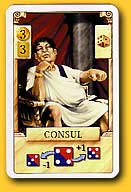 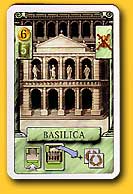 |
|
|
|
  |
|
|
|
|
|
|
|
|
|
|
|
|
|
|
|
|
|
|
|
|
|
|
|
|
|
  |
|
|
|
|
|
|
|
|
|
|
|
|
|
|
|
|
|
|
|
|
|
|
|
|
|
| x |
|
|
|
|
|
|
|
|
|
|
|
|
|
|
|
|
|
|
|
|
|
|
|
|
|
|
|
|
|
| x |
|
|
|
|
|
|
|
|
|
|
|
|
|
|
|
|
|
|
|
|
|
|
|
|
|
|
|
|
|
 |
|
|
|
|
|
|
|
|
|
|
|
|
|
|
|
|
|
|
|
|
|
|
|
|
|
 |
|
|
|
|
|
|
|
|
|
|
|
|
|
|
|
|
|
|
|
|
|
|
|
|
|
| x |
|
|
|
|
|
|
|
|
|
|
|
|
|
|
|
|
|
|
|
|
|
|
|
|
|
|
|
|
|
 |
|
|
|
|
|
|
|
|
|
|
|
|
|
|
|
|
|
|
|
 |
|
|
|
|
|
|
|
|
|
|
|
|
|
|
|
|
|
|
|
|
|